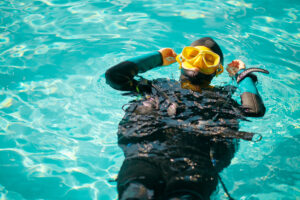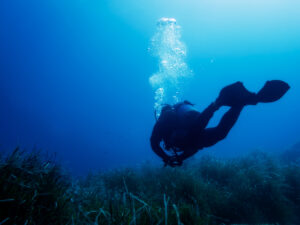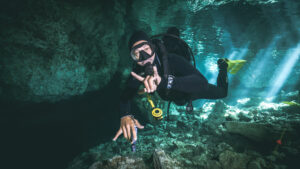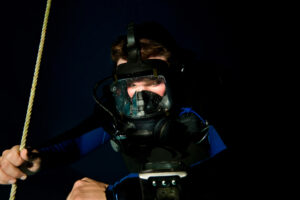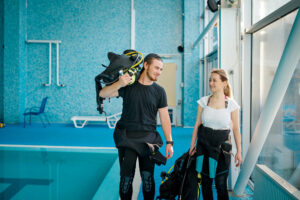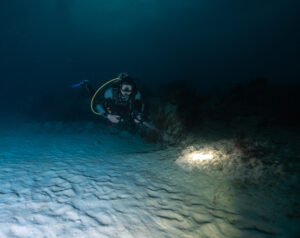What is Vertigo?
Vertigo, a sensation of spinning or dizziness, can significantly impact one’s sense of balance and orientation. In the context of scuba diving, this condition becomes particularly relevant and potentially hazardous. Divers who experience vertigo underwater may struggle with maintaining their equilibrium, which can lead to disorientation and dangerous situations. This article delves into the causes, impacts, diagnosis, prevention, and management of vertigo specifically for scuba divers.
Understanding Vertigo
Vertigo is a condition where an individual feels as though they or their surroundings are spinning. This sensation can be both disorienting and debilitating, often accompanied by nausea, vomiting, and sweating. While vertigo can occur due to various reasons, including inner ear problems and neurological conditions, it takes on particular characteristics and risks in the underwater environment.
In medical terms, vertigo is typically classified into two categories: peripheral and central. Peripheral vertigo is related to inner ear problems, such as benign paroxysmal positional vertigo (BPPV), labyrinthitis, and Meniere’s disease. Central vertigo, on the other hand, is associated with issues in the brainstem or cerebellum. For scuba divers, vertigo most commonly stems from issues related to the inner ear, which plays a crucial role in balance and spatial orientation.
Underwater vertigo, or alternobaric vertigo, occurs when there is an imbalance in the pressure between the middle ears. This imbalance can be caused by rapid ascents or descents, poor equalization techniques, or pre-existing conditions affecting the ears. The sensation of spinning underwater can lead to confusion and panic, making it difficult for divers to maintain proper buoyancy and direction.
Causes of Vertigo in Scuba Diving
One of the primary causes of vertigo in scuba diving is inner ear barotrauma. This condition occurs when the pressure inside the ear fails to equalize with the external water pressure, leading to discomfort and damage. Divers may experience inner ear barotrauma during rapid ascents or descents, especially if they have difficulty equalizing pressure. Symptoms include dizziness, hearing loss, and a sensation of fullness in the ear, all of which can contribute to vertigo.
Disorientation due to poor visibility or confusing underwater environments is another significant cause of vertigo. In low visibility conditions, such as murky waters or night dives, divers may struggle to discern their orientation. The lack of visual references can lead to spatial disorientation, making it challenging to determine which way is up or down. This disorientation can trigger vertigo, especially if the diver is already prone to the condition.
Nitrogen narcosis, a condition caused by breathing nitrogen at high pressures, can also contribute to vertigo. As divers descend deeper, the increased partial pressure of nitrogen can have narcotic effects, leading to impaired judgment, altered perceptions, and a sense of euphoria or anxiety. These effects can exacerbate the sensation of vertigo, particularly if the diver is not accustomed to deep diving or has exceeded their comfort zone.
Impact on Scuba Divers
Experiencing vertigo underwater can have severe physical and psychological impacts on scuba divers. Physically, the sensation of spinning or dizziness can make it difficult to maintain proper buoyancy and control. Divers may find themselves unintentionally ascending or descending, increasing the risk of decompression sickness or barotrauma. Additionally, the disorientation caused by vertigo can lead to collisions with underwater structures, marine life, or other divers.
The psychological effects of vertigo can be equally daunting. Divers experiencing vertigo may feel a sense of panic or anxiety, further impairing their ability to think clearly and make rational decisions. This panic can escalate quickly, leading to poor decision-making and potentially life-threatening situations. For instance, a diver in a state of panic might attempt a rapid ascent to the surface, increasing the risk of decompression sickness or pulmonary barotrauma.
Several case studies highlight the dangers of vertigo in scuba diving. In one instance, a diver experienced severe vertigo during a deep dive, leading to disorientation and an uncontrolled ascent. Despite efforts to manage the situation, the diver suffered from decompression sickness and required immediate medical attention. Such cases underscore the importance of understanding and mitigating the risks associated with vertigo in underwater environments.
Diagnosis and Identification
Diagnosing vertigo in scuba divers involves recognizing the symptoms and understanding the potential triggers. Divers who experience a sudden onset of dizziness, nausea, or a spinning sensation should consider the possibility of vertigo. Medical professionals can conduct various tests to determine the cause of vertigo, including hearing tests, balance assessments, and imaging studies. Identifying the underlying cause is crucial for developing an effective treatment plan.
The role of dive buddies in identifying vertigo cannot be overstated. Dive buddies should be vigilant for signs of distress in their partners, including unusual movements, difficulty maintaining buoyancy, or visible discomfort. Communication is key; divers should establish clear signals to indicate if they are experiencing vertigo or other issues. By staying alert and responsive, dive buddies can help prevent minor incidents from escalating into emergencies.
Self-awareness and regular health checks are essential for divers, particularly those who are prone to vertigo. Divers should monitor their health and seek medical advice if they experience any symptoms of vertigo, both in and out of the water. Regular check-ups with a dive medicine specialist can help identify any underlying conditions that might contribute to vertigo and ensure that divers are fit to participate in their chosen activity.
Prevention Strategies
Preventing vertigo in scuba diving involves several strategies aimed at minimizing the risk factors associated with the condition. Pre-dive preparation is crucial; divers should ensure they are in good health and free from any conditions that might predispose them to vertigo. This includes managing allergies, avoiding upper respiratory infections, and refraining from diving if they have a cold or congestion.
Effective equalization techniques are vital for preventing inner ear barotrauma, a common cause of vertigo. Divers should practice equalizing pressure in their ears regularly and use methods such as the Valsalva maneuver, Toynbee maneuver, or swallowing to equalize effectively. It is essential to ascend and descend slowly, giving the ears time to adjust to the changing pressure and reducing the risk of barotrauma.
Navigating and orienting in challenging dive conditions requires careful planning and practice. Divers should familiarize themselves with the dive site, paying attention to landmarks and natural features that can serve as reference points. In low visibility conditions, using a dive light and maintaining close proximity to a dive buddy can help reduce disorientation. Practicing good buoyancy control and avoiding rapid movements can also minimize the risk of vertigo.
Management and Treatment
Managing vertigo during a dive requires immediate and calm action. If a diver experiences vertigo underwater, they should signal their dive buddy and attempt to find a stable reference point, such as the seabed or a stationary object. Maintaining a steady position and focusing on controlled breathing can help reduce the sensation of spinning. It is crucial to avoid sudden movements or rapid ascents, as these can exacerbate the condition.
Post-dive care involves monitoring symptoms and seeking medical attention if necessary. Divers who experience severe or persistent vertigo should consult a healthcare professional, preferably one with experience in dive medicine. Treatment may include medications to alleviate symptoms, such as anti-nausea drugs or vestibular suppressants. In some cases, further evaluation and treatment by an ear, nose, and throat specialist may be required.
Long-term management strategies for divers prone to vertigo include regular medical check-ups and adherence to best practices for dive safety. Divers should be honest about their medical history and any episodes of vertigo when completing dive medical forms. Staying within personal limits, avoiding excessive depth or duration, and maintaining good overall health can help mitigate the risks associated with vertigo in scuba diving.
Key Takeaways
Understanding vertigo and its implications for scuba divers is essential for ensuring safety underwater. By recognizing the causes, impacts, and symptoms of vertigo, divers can take proactive steps to prevent and manage this condition. Effective equalization techniques, careful pre-dive preparation, and immediate management strategies are crucial for reducing the risks associated with vertigo and ensuring a safe and enjoyable diving experience.


